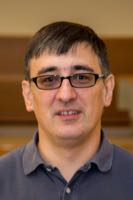ECE Departmental Seminar
Energy-Efficient RF powered tag-based sensory networks
Prof. Milutin Stanacevic
 Friday, 11/3/17, 11:00am
Friday, 11/3/17, 11:00am
Light Engineering 250
Abstract: It is not hard to imagine that in the near future most of the physical objects around us will be tagged. These tags will be used for recognizing the activities and interactions of all living beings and physical objects. However, it is hard to imagine that this vision can be achieved using either conventional RFID tags or wireless sensor nodes with active radios. We envision a paradigm shift toward a passive backscatter-based tag-to-tag networks where RF tags completely rely on the incident RF energy, either ambient or from a dedicated RF exciter, not only for the energy delivery, but also for communication and sensing the environment. We present an overview of the challenges related to the implementation of robust and reliable tag-to-tag communication links and propose new power-aware tag architecture. We also present a technique for measurement of the phase of the backscatter-based tag-to-tag channel that enables RF-based human activity recognition and detection of object interactions using passive tag-to-tag network. The similar vision of the passive RF powered devices applies to the neural implants in the brain, where with extreme miniaturization these devices can be scattered all over the brain at different depths. In this talk, we will focus on RF energy delivery as one of the main challenges for the deployment of these micrometer sized implants.
Bio: Milutin Stanacevic received the B.S. degree in Electrical Engineering from the University of Belgrade, Belgrade, Serbia, in 1999, and the M.S. and Ph.D. degrees in Electrical and Computer Engineering from the Johns Hopkins University, Baltimore, MD, in 2001 and 2005, respectively. In 2005, he joined the faculty of the Department of Electrical and Computer Engineering, Stony Brook University, Stony Brook, NY, where he is currently an Associate Professor. Dr. Stanaćević is a recipient of the National Science Foundation(NSF) Career Award and IEEE Region 1 Technological Innovation Award. He was an Associate Editor of the IEEE Transactions on Biomedical Circuits and Systems and currently serves on several technical committees of the IEEE Circuits and Systems Society.
